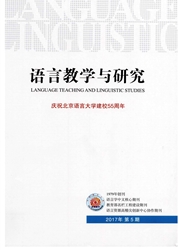

 中文摘要:
中文摘要:
本文以20个自发性口语叙事语篇为语料,研究了量词在该类语篇中的形式特征,并分析了这些特征的成因。研究发现,在口语叙事中量词以通用量词为主,并且量词与名词搭配不规范、首指与回指时量词不同一、量词紧接重复等现象突出。造成量词呈现出如此标记性的原因是,量词在口语叙事语篇中的功能有限,叙事者为了追求认知经济,为了能合理地分配有限的认知资源,在生成量词时对其进行了弱化处理。
 英文摘要:
英文摘要:
Based on the investigations on the 20 oral narratives, this paper explores the grammatical properties of noun classifiers, and analyzes the cognitive reasons for these properties. The research shows that these classifiers are weakened and have marked forms as they frequently mismatch nouns, inconsistency go with the same noun, and they are often cloned continuously in neigh- boring classification-noun phrases, because general classifiers override non-general ones. These characteristics are the results of the meager role of classifiers in narrative development and the results of cognitive economy and optimality in oral discourse.
 同期刊论文项目
同期刊论文项目
 同项目期刊论文
同项目期刊论文
 期刊信息
期刊信息
